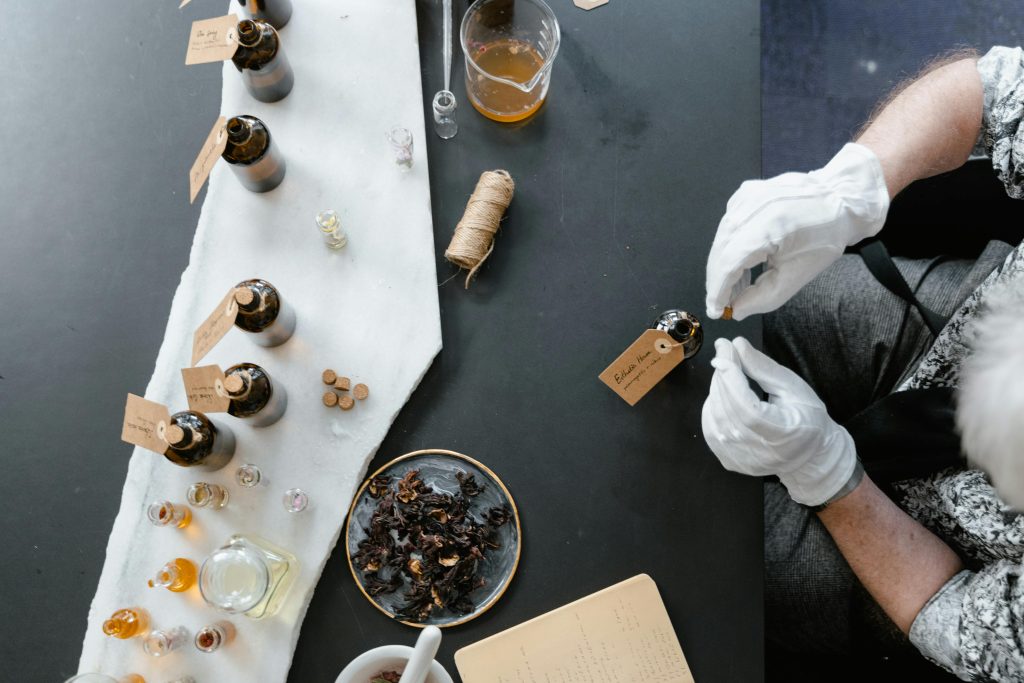In the intricate world of fragrance production, perfume oil is the heart of every captivating scent, blending chemistry and artistry to create memorable aromas. As a leading supplier, Fasinaaroma provides manufacturers with premium fragrance oils that ensure quality and consistency. This article delves into the science behind why these oils smell so good, their role in production, how to select the best ones, and essential precautions for factories.
Perfume Oil in Fragrance Production
Perfume production is a sophisticated process that transforms raw materials into alluring scents. The key stages include:
- Formulation: Perfumers craft the scent by blending top, middle, and base notes, with perfume oils as the core component.
- Dilution: Fragrance oil is mixed with a carrier, like ethanol, to achieve concentrations such as Eau de Parfum.
- Maceration: The mixture ages to enhance scent depth and stability.
- Filtration: Impurities are removed for clarity and purity.
- Bottling: The final product is packaged for distribution.
Perfume oil is critical during formulation, defining the scent’s character, and in dilution, shaping the fragrance’s strength.
Why Fragrance Oil Creates Captivating Scents
Fragrance oil is the essence of a perfume’s appeal, composed of volatile aromatic compounds that interact with the olfactory system. These compounds, whether natural or synthetic, are blended to evoke emotions and memories. The volatility of perfume oils ensures a gradual release of top, middle, and base notes, creating a layered scent experience. Their concentration, typically 5-30% in the final product (e.g., 15-20% for Eau de Parfum), enhances longevity and intensity.

Selecting Premium Perfume Oil for Factories
Choosing high-quality perfume oil is vital for producing top-tier fragrances. Key factors include:
- Regulatory Standards: Ensure fragrance oils comply with IFRA guidelines for safety. Our expertise in fragrance production ensures adherence to global standards.
- Scent Consistency: Suppliers like Fasinaaroma deliver uniform perfume oils for reliable production. Reliable sourcing is key to achieving dependable results in manufacturing.
- Natural vs. Synthetic: Natural oils provide authenticity, while synthetic oils offer consistency and cost-efficiency.
- Chemical Stability: Select oils with high stability to preserve scent integrity.
- Trusted Suppliers: Partner with wholesalers like Fasinaaroma for transparent sourcing. Building strong partnerships can streamline your production process.
Preparing for Perfume Oil Use
Before using perfume oil, factories must take precautions:
- Allergen Testing: Confirm fragrance oils are free from restricted allergens per IFRA standards.
- Batch Sampling: Test each batch for scent and quality consistency.
- Proper Storage: Store oils in airtight, dark containers at cool temperatures to avoid oxidation.
- Documentation Review: Check the supplier’s MSDS and CoA for purity. Access to detailed product documentation supports informed decision-making.
Best Practices for Fragrance Oil Application
Using fragrance oil in manufacturing requires precision:
- Accurate Measurement: Use calibrated tools to measure perfume oil quantities for consistent profiles.
- Controlled Environment: Blend oils in a clean, temperature-controlled facility.
- Gradual Blending: Add perfume oil slowly during dilution for even distribution.
- Safety Protocols: Workers should wear protective gear to avoid irritation.
Post-Production Perfume Oil Practices
After using perfume oil, factories should:
- Clean Equipment: Clean tools to prevent cross-contamination between batches.
- Proper Disposal: Dispose of unused oils per environmental regulations.
- Quality Testing: Test the final perfume for scent accuracy and stability.
- Inventory Management: Track usage to avoid delays. Efficient supply chain management keeps your operations running smoothly.
Industry Insights: Wholesale Perfume Oil Benefits
Wholesale perfume oils from suppliers like Fasinaaroma enable factories to produce high-quality fragrances efficiently. They offer diverse scent profiles, from florals to musks, meeting client demands. Bulk purchasing reduces costs, boosting profitability. Sustainable fragrance oils align with eco-conscious trends, enhancing competitiveness. Our commitment to sustainable practices aligns with the industry’s evolving needs.
Conclusion
The science behind perfume oil lies in its ability to blend volatile compounds into captivating scents. By sourcing premium fragrance oils from Fasinaaroma, factories can optimize production, ensure consistency, and meet market demands. Careful selection, precise handling, and diligent post-use practices maximize these compounds’ potential, enabling manufacturers to create exceptional fragrances for the global market.